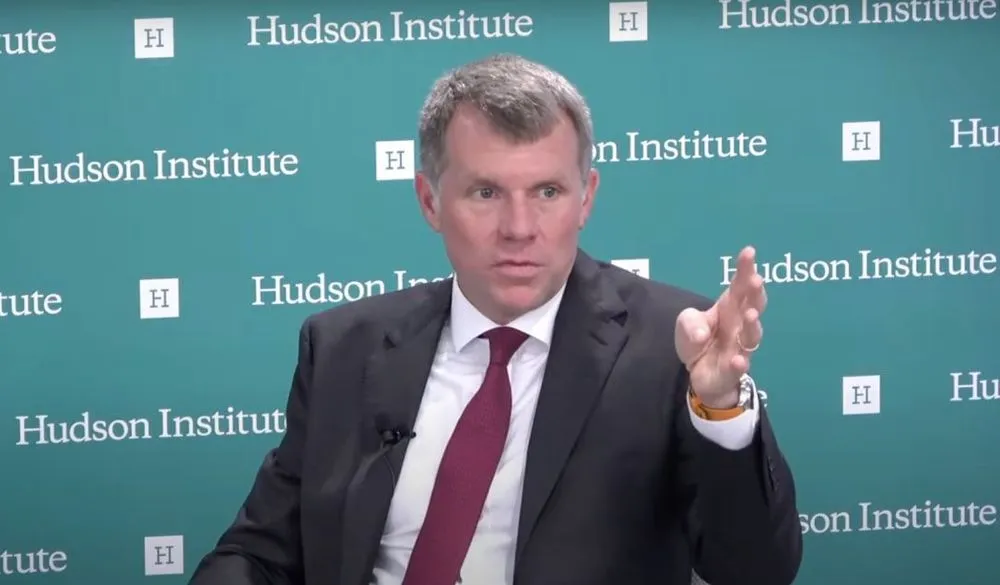State Dept cyber ambassador calls for new AI regulations
In a wide-ranging interview Wednesday, The State Department’s cyberspace ambassador cautioned about the dangers posed by artificial intelligence, China, and the vast vulnerabilities embedded in internet infrastructure while also hailing the importance of the agency’s newly created cyber bureau.
The emerging national discussion around AI dominated the start of the interview with Nate Fick, the State Department’s ambassador at large for cyberspace and digital policy, who said in an interview at the Hudson Institute in Washington that the United States has less than a year to establish a regulatory and governance infrastructure for generative artificial intelligence and large language models. Failing to do so would mean the technology will be abused to spread disinformation, inflict violence, and carry out cyberattacks, Fick said.
Citing the four primary American companies working on AI — Google, Microsoft, Open AI and Anthropic — as capable and trustworthy models, Fick worried about what he called a “fifth model” built by a company that's less trustworthy, or open sourced.
“If this is 1945, we don't have until 1957 to put together some sort of a regulatory or governance infrastructure,” Fick said. “The near-term risk practically that I am most animated by is disinformation and misinformation and what the rapid dissemination of fake content to flood the zone, particularly in a political context, does to our discourse.”
He worried about the upcoming presidential election and how AI will make it harder than it’s ever been to separate truth from fiction, which he said could have “huge corrosive effects.” But he said he worries much more deeply about the “application of these technologies in lethal terms, autonomous weapons, biotechnology, [and] to some extent cybersecurity.”
Competing with China
The interview also focused on competition with China. Fick highlighted the importance of the U.S. winning over “the consequential hedging states” with what he called an affirmative vision.
“If we try to match the Chinese financially, across the developing world, across the global south in each of these deployments, we don't have the capacity or the political will to do it,” Fick said. “Because when a trusted vendor comes in with a $400 million bid, and Huawei comes in with a zero dollar bid and a soccer stadium … we're playing market economics, they're playing geopolitics.”
Calling the reconstitution of U.S. alliances critical, Fick cited the success of Australia's Quad partnership with India, Japan and the U.S., a network dedicated to fueling a stable and open Indo-Pacific, and the revitalization and digitalization of NATO, which he said has been “helped in a lot of ways by Vladimir Putin.”
However, Fick said he has been alarmed by the degree to which Western companies have lagged behind while China is executing what he called “a full court press.”
The West’s reliance on unsecure communications technology is a particularly grave threat, Fick said, citing “the pipes” that deliver the internet to American phones, satellites and wireless networks.
“We can spend every dollar we have in every hour we have on cybersecurity, securing all the applications and the data that sits on top of that architecture and then we end up with very secure uncorrupted packets going back to Beijing in the architecture of the untrusted framework,” he said.”That's why getting the architecture right is important and it's why the Chinese have made a 25-year concerted, political and economic push to do that.”
The ambassador said he had not yet been briefed on State Department Secretary Antony Blinken’s just concluded trip to China but said such meetings are critical, particularly because they rely on what he called the “human factor.”
“When I was in the Marines, we talked about the last 100 yards — the idea that you had this massive defense budget, this institution and millions of people, all this money, all this doctrine, but it funneled into … a person in a rifle on a bridge someplace and in that last 100 yards, it's just you,” Fick said. “Secretary Blinken talks about that in diplomacy — he calls it the last three feet.”
With that analogy in mind, Fick argued for a more robust State Department role in the federal government’s cybersecurity apparatus, saying that when he dealt with the government in his previous life as a cybersecurity company CEO he interacted only with the Defense Department, Cyber Command, the Department of Homeland Security and the Justice Department.
“We have to assert our nation's lead foreign affairs agency’s role in the interagency process,” Fick said, referring to the new State Department bureau he oversees as a critical element of that approach. “We need to put diplomacy back at the forefront.”
Suzanne Smalley
is a reporter covering digital privacy, surveillance technologies and cybersecurity policy for The Record. She was previously a cybersecurity reporter at CyberScoop. Earlier in her career Suzanne covered the Boston Police Department for the Boston Globe and two presidential campaign cycles for Newsweek. She lives in Washington with her husband and three children.



